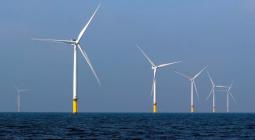'This is a climate and energy security crisis – these four steps can help green hydrogen solve it'
The terrible events in Ukraine mean we now face a dual crisis of climate and security that requires us to stop merely fiddling at the margins of a fossil fuel-based economy. More radical solutions are needed – I’ll set out the four key steps below – with green hydrogen playing a central role.
Ursula von der Leyen, president of the European Commission, is right when she concludes that “the EU must get rid of its dependency on fossil fuels”. We must now have the courage and determination to act.
This stark challenge comes on top of the recent conclusion of the UN IPCC’s latest climate report, published last month, when Hoesung Lee, chair of the organisation concluded that “our actions today will shape how people adapt and nature responds to increasing climate risks”.
It can be done. We have the technology. We have the financial capacity. Economic prosperity and stability in Europe will not be achieved by a slow shift away from relying on oil and gas from Russia or elsewhere. The opposite is true and drastic change is required.
It is madness that the EU imports 90% of its gas consumption, with Russia providing around 45% of those imports, plus 25% of oil imports and 45% of coal imports. Moreover, it makes little sense to replace gas from Russia with gas from other autocratic regimes.
There is broad agreement that direct renewable electricity should be used wherever possible. Then batteries should be used where possible. Where neither direct electricity or batteries will do, for shipping, long-haul transport and heavy industries such as steel making, we need to use green hydrogen. If renewable energy is used to produce hydrogen, an energy storage and supply chain is created with close to zero carbon emissions.
According to the International Energy Agency, up to 25% of final energy end use in 2050 could be through hydrogen. This hydrogen has to be green. Producing hydrogen from fossil fuels has so far only resulted in significant carbon emissions, and no one has yet demonstrated that this problem can be solved (despite billions of dollars of investment).
Here is how we get to the accelerated production and use of green hydrogen in Europe.
Ambitions need to be bold and reflect what is needed
The EU’s new REPowerEU policies are welcome and a good start, but still woefully inadequate. The Commission’s aim to boost hydrogen production and imports to 20 million tonnes per annum by 2030 should be compared with for example Fortescue Future Industries’ commitment to produce 15 million tonnes per annum in Australia alone by 2030. If one company can commit to this, the EU can aim a lot higher.
Our economies need to be transformed. It will be painful in places, but also unleash extraordinary opportunities. Imports are not a threat. They are an opportunity to support other countries as they make the same essential transition. Global safeguards and standards are certainly needed, and this is precisely what the Green Hydrogen Organisation (GH2) is focusing on.
Eliminate subsidies for fossil fuels
We must seize the moment of unparalleled international solidarity to level the playing field for renewable energy. Governments should stop approving new fossil fuel projects and must remove the massive direct and in-direct subsidies currently directed toward the fossil fuel sector.
In January 2021, the European Court of Auditors found that EU countries spent €56bn euros on fossil fuel subsidies in 2019, with 15 states spending more on fossil fuels than green energy.
Most fossil fuel subsidies in EU countries are tax cuts or exemptions. EU tax rules also mean highly polluting fuels such as coal face lower levies than some cleaner alternatives or electricity. Globally, the IMF has calculated that the fossil fuel industry receives a stunning $5.2 trillion in subsidies annually (6.4% of global gross domestic product).
These policies are also extraordinarily regressive, reinforcing poverty and inequality, with the richest 20% of households receiving six times more in subsidies than the poorest 20%. Imagine what could be accomplished if this funding was redirected to more sustainable and equitable options.
Progressive industrial policies are urgently required
Across the EU, there is a need to address the bottlenecks on permitting new renewable energy production. Wind and solar farms will require significant land and sea use. Planning processes need to be respected, but the permitting process is outdated in some countries.
Just as we have during the last century been building ports, motorways and railways, there is a need to explain and build awareness about the renewable energy infrastructure that is now required. There is a need to invest in dedicated hydrogen infrastructure linked to priority sectors for green hydrogen consumption. We need to give green hydrogen producers access to the existing networks and infrastructure.
A Central European Energy Transition plan is needed
The plan should go beyond the EU’s 'Fit For 55' package. War is raging and it is too early to plan for the future of Ukraine. The rest of Central Europe is, however, particularly dependent on oil, gas and coal from Russia. The countries of Central Europe need urgent support with their energy transition.
The renewable energy sector needs Marshall Plan-like support to shift away from a reliance on mainly gas to renewable electricity and green hydrogen. Each Central European country should draw up a revised Energy Transition Plan. The European Investment Bank and other public institutions should be provided with additional resources and expanded mandates.
The German Finance Minister Christian Lindner said recently that clean energy should be considered “the energy of freedom”. A silver lining of the horrors in Ukraine is the unity and determination the unprovoked war has brought. We would let down current and future societies if we are not bold now in making the energy transition happen faster.
- Jonas Moberg is CEO at the Green Hydrogen Organisation (gh2.org)



